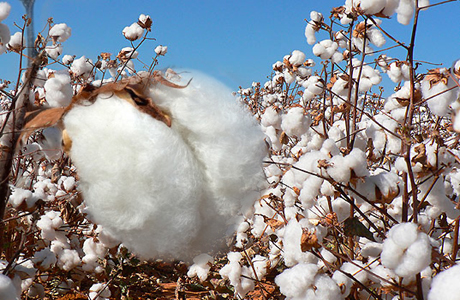Restoring cotton standardisation fee
By
Mohammad Hussain Khan
 Sindh
has opposed the levying of the cotton standardisation fee
without the payment of premium to cotton producers and
ginners.
Sindh
has opposed the levying of the cotton standardisation fee
without the payment of premium to cotton producers and
ginners.
The cotton standardisation fee (CSF) was proposed to be
levied at the ginning stage in October by the federal
textile ministry.
However, it required the secretaries of Sindh and Punjab
agriculture departments to link the renewal of the working
licences of cotton ginning factories with a CSF payment of
Rs5 per bale at the original rate.
The ministry is not only interested in restoring.
The CSF — which was earlier suspended for one season under
the clean cotton programme — but also plans to raise it to
Rs20.It also intends to recover Rs316.91m of CSF dues from
ginners for the 2008-09 and 2012-13 seasons.
In October, the federal ministry expressed its concern to
the Sindh agriculture department regarding high
contamination levels and lack of required grading.
Standardisation — an issue of proper packaging of cotton
bales — would only be resolved once ginners are made to
avail the services of the Pakistan Cotton Standardisation
Institute (PCSI) while paying the CSF.
The PCSI, it says, has so far been able to train barely 203
cotton classers and 2,247 cotton selectors in Multan, Sukkur
and Karachi due to lack of cooperation from the ginners.
Despite being the fourth largest cotton producer, Pakistan
still does not have a uniform cotton grading and
standardisation system.
According to Federal Cotton Commissioner Dr Khalid Abdullah,
the decision over the CSF would be taken after consultation,
as the government doesn’t want to disadvantage any sector.
Practically, he said, the CSF would start at the stage of
picking, if growers could ensure picking of contaminant-free
cotton, to get a better price from ginners, who would then
produce quality lint cotton to be sold to textile millers
after adding the cost.
“This would develop a value chain and create a win-win
situation for all,” he asserts, and argues that the payment
of Rs5 per bale translates into Re1 per maund/37kg, as a
bale is equivalent to 170kg of phutti.
The CSF was imposed to meet the international market’s
requirements of clean cotton and arrest the declining trend
in export prices. Its parameters were to be ensured by the
PCSI, which was established in 2002.
But it did not turn out as simple as it was then deemed.
Neither the ginners, growers, nor the Sindh government felt
that it could be implemented in letter and spirit.
Agriculture officials and growers pointed out that
considering the manual picking of cotton, the chances of
mixture of trash in seed cotton could not be ruled out.
Growers tried their best to ensure the picking of clean seed
cotton for ginners.
The provincial agriculture department had banned the use of
hessian bags for transportation of seed cotton when the
programme was launched. Such bags contaminate cotton.
Besides, training was given to cotton pickers.
And growers complain that ginners cut the price during the
weighing of the cotton crop. Growers bear the additional
labour charges for ensuring contaminant-free seed cotton,
but don’t get any advantage from it.
Some factories were selected in
Punjab and Sindh where contaminant-free cotton bales were
produced. The programme continued for two seasons.
Then, its recovery was suspended
as the ginners went on strike in 2008 against the CSF. For
two seasons, Rs1.089m were recovered under the CSF from 18
ginning factories in 2006-07 and Rs198,305 from just two
factories in 2007-08 in Sindh.
Quality premium (Rs50 per maund for growers) was given for
the two seasons in some districts on an experimental basis
when the CSF was first introduced. The total premium was
calculated on a 50-50 sharing basis at Rs70m.
It was meant for production of
an estimated 100,000 clean grade-I/II bales of cotton after
ginning 1.4m maunds of clean seed cotton of grade-II or
above.
It was paid for by the federal
and the Sindh and Punjab governments as per their share.
Sindh deposited its share of Rs10.5m.
Former Pakistan Cotton Ginners Association (PCGA) chairman
Mahesh Kumar says if ginners pay the CSF of Rs5 per bale,
they would add it in their purchase price of phutti and
transfer it to growers instead of millers.
The millers, he says, are not
willing to buy and raise quality.
Cotton producers like Mahmood Nawaz Shah also feel such
decisions are taken to the farmers’ detriment by a weak
regulatory set up.
However, farmers, in principle,
support that quality standards and parameters must be
ensured, considering the competitive market’s needs.
Considering these factors, the Sindh government has proposed
to the federal textile ministry that the burden of CSF
should not be passed on to growers in any manner.
The clean cotton programme could
be linked with the payment of quality premium to growers,
which would eventually and automatically resolve the CSF
issue.
It also seeks a mechanism for
payment of this premium to ginners after taking all
stakeholders on board, and imposing the CSF from the next
season.
December 2014
Courtesy:
Dawn News